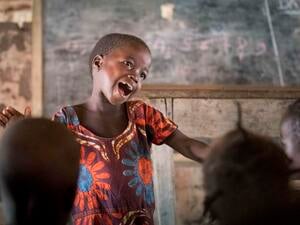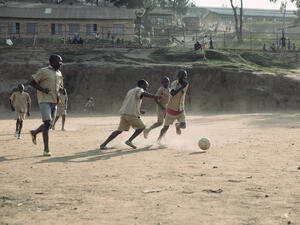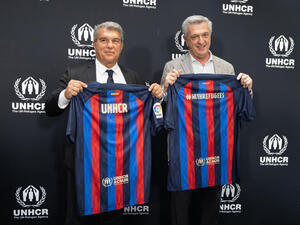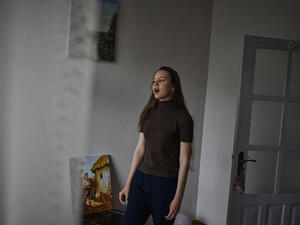Q&A: Jane Goodall's quest to empower refugee children
Q&A: Jane Goodall's quest to empower refugee children

Jane Goodall surrounded by Congolese children in Tanzania's Lugufu Refugee Camp.
LUGUFU REFUGEE CAMP, Tanzania, January 30 (UNHCR) - British primatologist Jane Goodall is best known for her study of chimpanzee social and family interactions in Tanzania's Gombe Stream National Park. But for the past decade, she has also been active, through the Jane Goodall Institute, in empowering refugee children in Tanzania. The Institute, working with the UN refugee agency, has been helping young Congolese in the Lugufu Refugee Camp improve their lives at the same time as building their confidence and teaching them how to respect others. Dr. Goodall, who has an adult son, spoke recently to UNHCR Mass Information Officer Jerome Seregni about this work. Excerpts from the interview:
How did you become involved with refugees?
Refugees have been an interest of mine for a long time. Witnessing them, I became concerned with youth programmes that did not provide any hope for children. When I came into contact with UNHCR in 2000, I decided to implement the "Roots and Shoots" programme for children living in and near Lugufu, a Congolese refugee camp in north-western Tanzania.
Tell us a bit more about this programme that you developed
In essence, the aim of "Roots and Shoots" is to promote peace education by dismantling divisions that may exist between refugees living in and around Lugufu camp and the Tanzanian population living next to them. We try to break [down] boundaries by establishing inter-school exchanges for children and by creating projects that encourage tolerance and mutual understanding. For instance, our "club members" [from among the refugees and the local population] are voluntarily working together to clean a protected forest near a school. Students often also participate in football matches and drama performances, which include environmental messages.
How do you see the link between wildlife, the environment and refugees?
People living in refugee camps are often accused of illegal hunting and of consuming bush meat, including chimpanzees and gorillas. My work was concerned with animals, but I always wanted to work with children. When I started to interact with refugee students in Tanzania a few years ago, I found that they did not have access to environmental classes at school. When I asked the children how many of them had ever visited a national park, the response was that only a very few had ever had the chance. Yet when we talked about wildlife and the environment, the students soon became very enthusiastic. All they needed was a chance to get involved.
Tell us more about those taking part in the "Roots and Shoots" programme
Our focus in Lugufu camp is on children that have been affected by war and conflict. So far, 15 schools - inside and outside the camp - have been involved in our programmes. But it is always the children themselves who decide whether or not to join one of our programmes. Those that enrol can either take care of orphans, do counselling for traumatized people, support grandparents or help in a small restaurant that serves food that is wholly wheat-based. Refugees have also been taken on educational excursions to the Gombe National Park, where they were taught about conservation issues through bush-meat awareness workshops, poultry farming education and tree planting.
What will happen to the programme when the camp closes?
We will continue our activities in DRC [Democratic Republic of the Congo] with the returnees. "Roots and Shoots" is like a family and we have to be present when they leave for their native country. Many children in the camp have told me that their participation has changed their lives. It still touches me. Recently, five young students living in Lugufu camp asked us to shift our activities to their country of origin - I certainly cannot deny them that opportunity.
What message do you have for the refugees in Lugufu?
That all of them, as individuals, can make the difference and [help] improve their country, their lives and their environment. That they should never give up hope. That peace comes with love, compassion and respect for other cultures, including for animal behaviour.
By Jerome Seregni in Lugufu Refugee Camp, Tanzania









